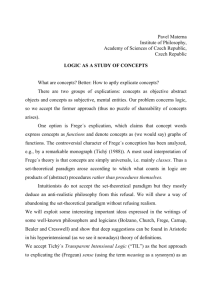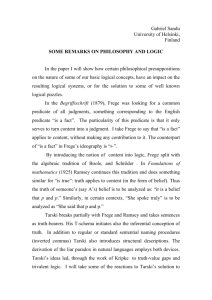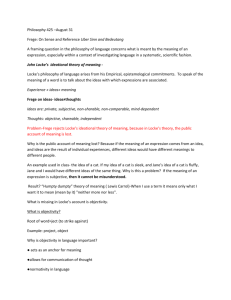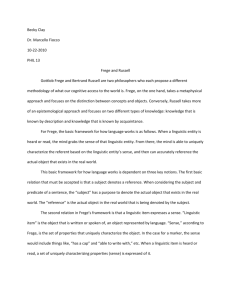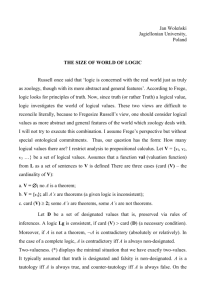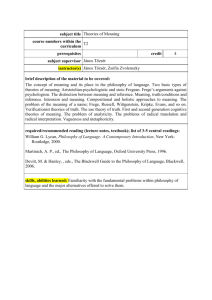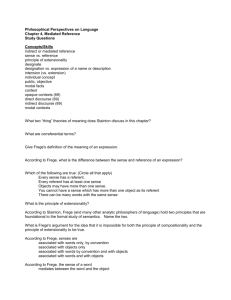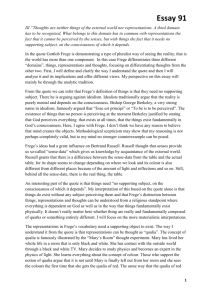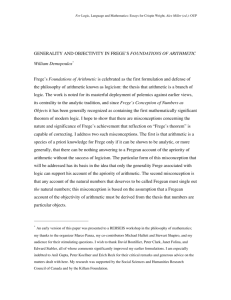Concepts are gappy or unsaturated and expressions referring to
advertisement
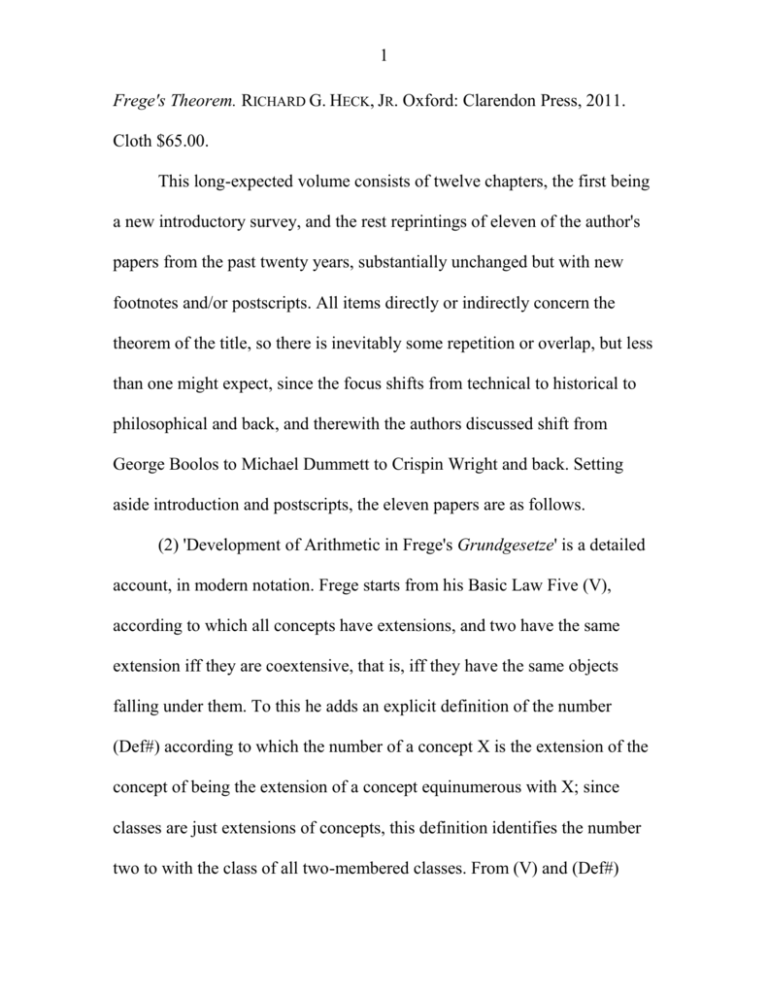
1 Frege's Theorem. RICHARD G. HECK, JR. Oxford: Clarendon Press, 2011. Cloth $65.00. This long-expected volume consists of twelve chapters, the first being a new introductory survey, and the rest reprintings of eleven of the author's papers from the past twenty years, substantially unchanged but with new footnotes and/or postscripts. All items directly or indirectly concern the theorem of the title, so there is inevitably some repetition or overlap, but less than one might expect, since the focus shifts from technical to historical to philosophical and back, and therewith the authors discussed shift from George Boolos to Michael Dummett to Crispin Wright and back. Setting aside introduction and postscripts, the eleven papers are as follows. (2) 'Development of Arithmetic in Frege's Grundgesetze' is a detailed account, in modern notation. Frege starts from his Basic Law Five (V), according to which all concepts have extensions, and two have the same extension iff they are coextensive, that is, iff they have the same objects falling under them. To this he adds an explicit definition of the number (Def#) according to which the number of a concept X is the extension of the concept of being the extension of a concept equinumerous with X; since classes are just extensions of concepts, this definition identifies the number two to with the class of all two-membered classes. From (V) and (Def#) 2 Frege derives Hume's Principle (HP), according to which all concepts have numbers, and two have the same number iff they are equinumerous, that is, iff there is a one-to-one correspondence between the objects falling under the one and those falling under the other. (In contrast to the other abbreviations I have introduced here, which are used merely for the sake of concise cross-reference, “HP” is used by Heck and others less as an abbreviation for than as an alternative to “Hume’s Principle,” an historically questionable label bestowed by Boolos on account of a citation of Hume in Frege that many feel ought to have been a citation of Cantor.) From (HP) Frege derives the axioms of Peano arithmetic (PA). Though Frege makes some further uses of (V) in the derivation, Heck explains that these are avoidable, thus justifying attribution to Frege of what has come to be called Frege's Theorem, the result that adding (HP) to second-order logic permits the derivation of (PA). (3) 'Grundlagen §82-§83', a joint work with Boolos, examines a place where the formal work in the 1893 Grundgesetze departs from the informal outline in the 1884 Grundlagen, because there is a slip in that earlier work, while (4) 'Frege's Principle' discusses Frege's derivation of (HP) from (V) and (Def#) in detail, emphasizing the role of an intermediate step, the principle of the title. 3 (5) and (6) 'Julius Caesar and Basic Law V' and 'The Julius Caesar Objection' take up different aspects of an exegetical mystery: (V) and (HP) are both examples of what are called abstraction principles, saying that the 'abstract' associated with one concept X is the same as that associated with some other concept Y iff X and Y stand in a certain equivalence relation. Why did Frege think the abstraction principle (HP) concerned with numbers left us with a problem about how we know Julius Caesar is not a number, a problem that his (Def#) was somehow supposed to solve, when the abstraction principle (V) concerned with extensions seems to leave us with an exactly parallel problem about how we know Julius Caesar is not an extension? This puzzle is closely connected with another: Why, when Russell's paradox showed (V) to be inconsistent, did Frege not just abandon (Def#) and base arithmetic on (HP) and Frege’s Theorem, as is done by contemporary neo-Fregeans? One common diagnosis runs as follows: While axiomatizations in mathematics (such as of projective geometry) often use different styles of variables for different kinds of objects (such as points and lines), Frege's Begriffsschrift allows only one style of variable for all objects or first-order entities, and the thoughts that entities come in kinds, that entities of the same order may nonetheless be of distinct kinds, and that entities of distinct kinds 4 have distinct identity criteria, all of which are the central ideas behind neoFregean responses to the Caesar problem, are simply thoughts Frege will not entertain. Indeed, he dare not entertain them, because lumping all first-order entities together as of the same kind is crucial to his derivation of (PA). Heck rejects this diagnosis on two counts. In (5) he argues that the texts show that the real root of the Caesar worry is not an unwillingness to recognize distinct kinds within the same order (or distinct 'sorts' within the same 'Sort'), but a hard-to-pin-down worry about how we apprehend numbers as logical objects, or at all. In (6) he argues that all the purposes in the derivation of (PA) served by lumping all first-order entities together as of the same kind could be accomplished by insisting that higher-level concepts with first-level concepts falling under them have numbers just as lower-level concepts with first-order entities falling under them do. Here one may have doubts about counting the first-level concepts falling under a higher-level concept if like Tyler Burge and unlike Heck, one takes seriously Frege's doctrine that, concepts being unsaturated, expressions referring to them must be unsaturated as well. This implies that when we attempt to refer to a concept using a saturated expression, we miss our target, and end up referring only to an associated object, the concept's extension. 5 For instance, when we say 'one, the concept Horse; two, the concept Donkey; three, the concept Zebra,' we are not really counting concepts. (7) 'Cardinality, Counting, and Equinumerosity' touches on another exegetical mystery that has exercised commentators from Dummett onwards (most recently Patricia Blanchette). If Frege's derivation is to establish anything about the epistemological status of, say, the quadratic reciprocity law, he had better be speaking about the same numbers that Gauss was speaking of. But it seems highly dubious, to say the least, that Gauss even tacitly thought of the number two as the class of all two-membered classes. How could Frege have thought, despite his offering a definition of number there is no reason to suppose anyone before him had ever had even implicitly in mind, that his results about the objects he calls 'numbers' have anything to do with higher arithmetic as practiced by number theorists? In exactly the same way, Heck insists that if neo-Fregeans base arithmetic (PA) on (HP). rather than (V) and (Def#) as with Frege, we may ask what the things they call 'numbers' have to do with the numbers of ordinary language and commonsense thought. Heck draws on results of parental observations of and psychological experiments with children to raise doubts about the centrality of (HP) to the ordinary, commonsense notion of number. 6 Here one may doubt about the relevance of observations of young children. When numerals are used as adjectives, as in 'There are six sheep in the meadow', they do not even appear to make reference to objects, and while such a usage as 'Two and two make four' may appear to do so, it is easily construable as elliptical for 'Two things and two things make four things.' It is hard to document the genuine reification of numbers as objects before the introduction of Pythagorean number theory and such expressions as 'six is perfect, seven prime, eight a cube, nine a square, ten triangular.' This development was accompanied by some disruption of the Greek language and by extravagant metaphysics, and appears to have been a major event in world intellectual history. It is far from clear that young children have yet arrived at the reification of numbers as objects, and correspondingly doubtful how much parents' amateur or psychologists' professional studies of them, or analogous anthropological or archeological investigations, can tell us about what is fundamental to the notion of number prevailing among adults in the modern developed world, let alone among professional mathematicians. The fact that wooden scaffolding was used in erecting a building does not imply that there is any wood in the foundations of the finished edifice. 7 (8) 'Syntactic Reductionism' is something of a warm-up for the previously unpublished (9) 'The Existence of Abstract Objects', Heck's most sustained polemic against neo-Fregean views on ontology, and one likely to generate considerable discussion. The view opposed is very roughly this, that we can introduce number-talk by explaining that (i) the number of these things is the same as the number of those things iff there are just as many of the former as of the latter. Here (i) presupposes that (ii) for any plurality of things, there is a number that is the number of those things, and presumably also that (iii) for any number, there is some plurality of things of which it is the number. It is also to be understood, lest a Caesar problem arise, that (iv) numbers are a previously unrecognized kind of thing, distinct from all things of previously recognized kinds — though (iv) will be taken to be implicit in (i) by those who assume that objects with different identity criteria are ipso facto of different kinds. The meaningful predicates of numbers are then all and only those given by predicates of pluralities having the feature called invariance, the feature that if there are just as many of these as of those, then these satisfy the predicate iff those do. Now there are other kinds of abstraction-talk that one ought to refuse to accept because they are either inconsistent or useless, and even in the absence of known inconsistency and presence of known utility, one cannot be compelled to accept number-talk, 8 but (so the line of thought Heck opposes goes) it cannot be made a prerequisite for accepting number-talk that it first be established that numbers 'really exist,' since until number-talk has been introduced, the question whether numbers exist cannot be raised, and after number-talk has been introduced, that question receives an immediate and trivial affirmative answer by (ii). Heck's extended discussion outlines a new attempt to evade this last claim, though in the end I find it difficult to say how far he has established anything beyond what is already conceded, that some kinds of abstraction-talk will be useless, and so presumably to be rejected, because there won't be any interesting predicates that are suitably invariant; and that concession does not in itself establish that the question whether the abstracts in question 'really exist' makes any sense, since if it's not useful to talk about such abstracts, we presumably shouldn't do so, and if we don't, then existence questions concerning them won't arise. On the other hand, Heck does raise some cogent questions about what is supposed to be so special about introducing a new sort of object through an abstraction principle like (i) rather than through some other type of postulate. (10) 'On the Consistency of Second-Order Contextual Definitions' is the oldest item in the volume. It answers negatively a question of Boolos, 9 namely, whether there is an effective test for distinguishing inconsistent abstraction principles such as (V) from consistent ones such as (HP). (11) 'Finitude and Hume's Principle' and (12) 'A Logic for Frege's Theorem' show respectively that a restricted version of (HP), only supplying numbers for concepts having finitely many things falling under them, still suffices for the derivation of (PA), and that a restricted logic, less rich than full second-order logic, still suffices for the derivation of a version of (PA). To me as a logician these were the single most interesting chapters, but since I am writing for a philosophical periodical, I will shortchange them as I have other technical papers, and as Heck himself has shortchanged his technical work in selecting publications for inclusion in his collection. So much by way of summary. Since no one (except perhaps an author) wants to read a review consisting of nothing but uncritical praise, I have allowed myself to use some of my limited space to express doubts on a couple of points. But though I have a few other doubts as well, overall there is much, much more to agree with in the book than to question, and there are many, many more insights, technical and historical and philosophical, to be gained from Heck's close and careful examination of the pertinent texts and issues than I have had space even to mention in passing. The volume is 10 essential reading for anyone interested in either or both of Frege and philosophy of mathematics. John P. Burgess Department of Philosophy Princeton University Princeton, NJ 08544-1006, USA jburgess@princeton.edu
